Welcome to Northernsoultrain
NORTHERN SOUL
Northern soul is a music and dance movement that emerged from the British mod scene, initially in northern England in the late 1960s. Northern soul mainly consists of a particular style of black American soul music based on the heavy beat and fast tempo of the mid-1960s Tamla Motown sound. The Northern soul movement, however, generally eschews Motown or Motown-influenced music that has met with significant mainstream success. The recordings most prized by genre enthusiasts are usually by lesser-known artists, and were initially released only in limited numbers, often by small regional United States labels such as Ric-Tic and Golden World (Detroit) Mirwood (Los Angeles) and Shout and Okeh (New York/Chicago).
Northern soul is also associated with particular dance styles and fashions that grew out of the underground rhythm & soul scene of the late 1960s, at venues such as the Twisted Wheel in Manchester. This scene (and the associated dances and fashions) quickly spread to other UK dancehalls and nightclubs like the Catacombs (Wolverhampton), the Highland Rooms at Blackpool Mecca, Golden Torch (Stoke-on-Trent), and Wigan Casino. As the favoured beat became more uptempo and frantic, by the early 1970s, northern soul dancing became more athletic, somewhat resembling the later dance styles of disco and break dancing. Featuring spins, flips, and backdrops, club dancing styles were often inspired by the stage performances of visiting American soul acts such as Little Anthony & The Imperials and Jackie Wilson.
During the Northern soul scene's initial years in the late 1960s and early 1970s, popular Northern Soul records were usually not recent releases, and generally dated from the mid-1960s. This meant that the movement was sustained (and "new" recordings added to playlists) by prominent DJs discovering rare and previously overlooked records. Later on, certain clubs and DJs began to move away from the 1960s Motown sound and began to play new releases with a more contemporary sound.
Northern Souls Top 600 part 4
Photograph of a sew-on patch featuring the clenched fist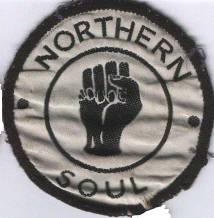 symbol adopted by the northern soul movement
The phrase northern soul emanated from the record shop Soul City in Covent Garden, London, which was run by journalist Dave Godin. It was first publicly used in Godin's weekly column in Blues and Soul magazine in June 1970. In a 2002 interview with Chris Hunt of Mojo magazine, Godin said he had first come up with the term in 1968, to help employees at Soul City differentiate the more modern funkier sounds from the smoother, Motown-influenced soul of a few years earlier
I had started to notice that northern football fans who were in London to follow their team were coming into the store to buy records, but they weren't interested in the latest developments in the black American chart. I devised the name as a shorthand sales term. It was just to say 'if you've got customers from the north, don't waste time playing them records currently in the U.S. black chart, just play them what they like - 'Northern Soul'
symbol adopted by the northern soul movement
The phrase northern soul emanated from the record shop Soul City in Covent Garden, London, which was run by journalist Dave Godin. It was first publicly used in Godin's weekly column in Blues and Soul magazine in June 1970. In a 2002 interview with Chris Hunt of Mojo magazine, Godin said he had first come up with the term in 1968, to help employees at Soul City differentiate the more modern funkier sounds from the smoother, Motown-influenced soul of a few years earlier
I had started to notice that northern football fans who were in London to follow their team were coming into the store to buy records, but they weren't interested in the latest developments in the black American chart. I devised the name as a shorthand sales term. It was just to say 'if you've got customers from the north, don't waste time playing them records currently in the U.S. black chart, just play them what they like - 'Northern Soul'
The venue most commonly associated with the early development of the northern soul scene was the Twisted Wheel in Manchester. The club began in the early 1950s as a beatnik coffee bar called The Left Wing, but in early 1963, the run-down premises were leased by two Manchester businessmen (Ivor and Phil Abadi) and turned into a music venue. Initially the Twisted Wheel mainly hosted live music on the weekends and Disc Only nights during the week. Starting in September 1963, the Abadi brothers promoted all-night parties at the venue on Saturday nights, with a mixture of live and recorded music. DJ Roger Eagle, a collector of imported American soul, jazz and rhythm and blues, was booked around this time, and the club's reputation as a place to hear and dance to the latest American R&B music began to grow.
Throughout the mid-1960s, the Twisted Wheel became the focus of Manchester's emerging mod scene, with a music policy that reflected Eagle's eclectic tastes in soul and jazz, and featuring live performances by British beat musicians and American R&B stars. Gradually, the music policy became less eclectic and shifted heavily towards fast-paced soul, in response to the demands of the growing crowds of amphetamine-fuelled dancers who flocked to the all-nighters. Dismayed at the change in music policy and the frequent drug raids by the police, Eagle quit the club in early 1967.
Commemorative sew-on patch similar to those worn by Twisted Wheel members.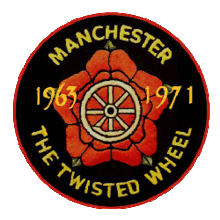 By then, the reputation of the Twisted Wheel and the type of music being played there had grown nationwide. By 1969, soul fans were travelling from all over the United Kingdom to attend the Saturday all-nighters. The venue's owners had been able to fill the vacancy left by Eagle with a growing roster of specialist soul DJs. After attending one of the venue's all-nighters in January 1971, Godin wrote: "...it is without doubt the highest and finest I have seen outside of the USA... never thought I'd live to see the day where people could so relate the rhythmic content of Soul music to bodily movement to such a skilled degree!
By then, the reputation of the Twisted Wheel and the type of music being played there had grown nationwide. By 1969, soul fans were travelling from all over the United Kingdom to attend the Saturday all-nighters. The venue's owners had been able to fill the vacancy left by Eagle with a growing roster of specialist soul DJs. After attending one of the venue's all-nighters in January 1971, Godin wrote: "...it is without doubt the highest and finest I have seen outside of the USA... never thought I'd live to see the day where people could so relate the rhythmic content of Soul music to bodily movement to such a skilled degree!
The Twisted Wheel gained a reputation as a drug haven, and under pressure from the police and other authorities, the club closed in January 1971. However, by the late 1960s, the popularity of the music and lifestyle associated with the club had spread further across the north and midlands of England, and a number of new venues had begun to host soul all-nighters. These included the King Mojo in Sheffield, The Catacombs in Wolverhampton, Room at the Top in Wigan and Va Va's in Bolton.
Commemorative sew-on patch similar to those worn by Golden Torch members. Northern soul reached the peak of its popularity in the mid to late 1970s.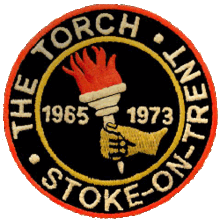 At this time, there were soul clubs in virtually every major town in the midlands and the north of England.The three venues regarded as the most important in this decade were the Golden Torch in Tunstall, Stoke (1971 to 1972), Blackpool Mecca (1971 to 1979) and Wigan Casino (1973 to 1981).
Although Wigan Casino is now the most well known, the best attended northern soul all-night venue at the beginning of the decade was the Golden Torch, where regular Friday night soul all-nighters began in late 1970. Chris Burton, the owner, stated that in 1972, the club had a membership of 12,500, and 62,000 separate customer visits. Despite its popularity, the club closed down due to licensing problems in March, 1972 and attention switched to soul nights at Blackpool Mecca's Highland Room, which had started rare soul nights in late 1971.
At this time, there were soul clubs in virtually every major town in the midlands and the north of England.The three venues regarded as the most important in this decade were the Golden Torch in Tunstall, Stoke (1971 to 1972), Blackpool Mecca (1971 to 1979) and Wigan Casino (1973 to 1981).
Although Wigan Casino is now the most well known, the best attended northern soul all-night venue at the beginning of the decade was the Golden Torch, where regular Friday night soul all-nighters began in late 1970. Chris Burton, the owner, stated that in 1972, the club had a membership of 12,500, and 62,000 separate customer visits. Despite its popularity, the club closed down due to licensing problems in March, 1972 and attention switched to soul nights at Blackpool Mecca's Highland Room, which had started rare soul nights in late 1971.
Commemorative sew-on patch similar to those designed by Russ Winstanley and sold at the Wigan Casino.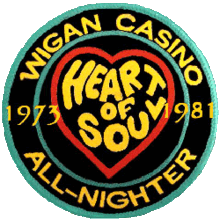 Wigan Casino began its weekly soul all-nighters in September 1973.Wigan Casino had a much larger capacity than many competing venues and ran its events from 2am until 8am. There was a regular roster of DJs, including the promoter Russ Winstanley. By 1976, the club boasted a membership of 100,000 people, and in 1978, was voted the world's number one discotheque by the American magazine Billboard.This was during the heyday of the Studio 54 nightclub in New York City. By the late 1970s, the club had its own spin-off record label, Casino Classics.
By this time, Wigan Casino was coming under heavy criticism from many soul fans. Contemporary black American soul was changing with the advent of funk, disco and jazz-funk, and the supply of recordings with the fast-paced northern soul sound began to rapidly dwindle. As a result, Wigan Casino DJs resorted to playing any kind of record that matched the correct tempo.Also, the club was subjected to heavy media coverage and began to attract many otherwise uninterested people of whom the soul purists did not approve.
Wigan Casino began its weekly soul all-nighters in September 1973.Wigan Casino had a much larger capacity than many competing venues and ran its events from 2am until 8am. There was a regular roster of DJs, including the promoter Russ Winstanley. By 1976, the club boasted a membership of 100,000 people, and in 1978, was voted the world's number one discotheque by the American magazine Billboard.This was during the heyday of the Studio 54 nightclub in New York City. By the late 1970s, the club had its own spin-off record label, Casino Classics.
By this time, Wigan Casino was coming under heavy criticism from many soul fans. Contemporary black American soul was changing with the advent of funk, disco and jazz-funk, and the supply of recordings with the fast-paced northern soul sound began to rapidly dwindle. As a result, Wigan Casino DJs resorted to playing any kind of record that matched the correct tempo.Also, the club was subjected to heavy media coverage and began to attract many otherwise uninterested people of whom the soul purists did not approve.
Blackpool Mecca was popular throughout the 1970s, although the venue never hosted all-nighters. The regular Saturday night events began at 8pm and finished at 2am, and initially, some dancers would begin their evenings at Blackpool Mecca and then transfer to Wigan Casino. In 1974, the music policy at Blackpool Mecca sharply diverged from Wigan Casino's, with the regular DJ including newly released US soul in his playlist. Whilst the tempo was similar to the earlier Motown Records-style recordings, this shift in emphasis heralded a slightly different style of northern soul dancing and dress styles at Blackpool Mecca and created a schism in the northern soul movement between Wigan Casino's traditionalists and Blackpool Mecca's more progressive approach, which accepted the more contemporary sounds of Philly soul, early disco and funk.
Other major northern soul venues in the 1970s include The Catacombs in Wolverhampton, Va Va's in Bolton, the 'Talk of The North' all-nighters at The Pier and Winter Gardens in Cleethorpes, Tiffany's in Coalville, Samantha's in Sheffield, Neil Rushton's 'Heart of England' soul club all-dayers at The Ritz in Manchester and the Nottingham Palais. As the 1970s progressed, the northern soul scene expanded even further nationally. There was a notable scene in the east of England with all-nighters at the St. Ivo Centre in St. Ives, the Phoenix Soul club at the Wirrina Stadium in Peterborough and the Howard Mallett in Cambridge. Other towns with notable northern soul venues at this time included Kettering, Coventry, Bournemouth, Southampton and Bristol.
When Wigan Casino closed in 1981, many believed that the northern soul scene was on the verge of disintegrating. However, the 1970s mod revival, the thriving scooterboy subculture and the Acid jazz movement produced a new wave of fans. The popularity of the music was further bolstered in the 1980s by a wave of reissues and compilation albums from small British independent record labels. Many of these labels were set up by DJs and collectors who had been part of the original northern soul scene. The 1980s — often dismissed as a low period for the northern soul scene by those who had left in the 1970s — featured almost 100 new venues in places as diverse as Bradford, London, Peterborough, Leighton Buzzard, Whitchurch, Coventry and Leicester. Pre-eminent among the 1980s venues were Stafford's Top of the World and London's 100 Club.
Today there are regular northern soul events in various parts of the United Kingdom, such as The Nightshift Club all-nighters at the Bisley Pavilion in Surrey and the Prestatyn Weekender in North Wales, Not forgeting the Kings Hall in Stoke On Trent. In an article entitled The Return Of Northern Soul in The Times in August 2008, broadcaster Terry Christian argued that northern soul was undergoing a distinct revival in the late 2000s. Christian cited the popularity of regular revivals of Twisted Wheel soul all-nighters at the original venue (in Whitworth Street, Manchester) plus the Beat Boutique northern soul all-nighters at the Ruby Lounge in Manchester. Many of those who ceased their involvement in the late 1970s have now returned to the scene and regularly participate in such events. As of 2009, Paul O'Grady has included a Northern Soul Triple in his weekly BBC Radio 2 show. He plays three northern soul hits, often at the request of his listeners
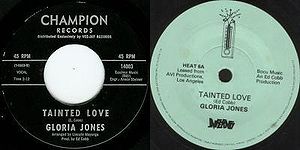 of Gloria Jones' Tainted Love
In the book Last Night A DJ Saved My Life: the history of the DJ, the authors describe northern soul as "a genre built from failures", stating: "...Northern Soul was the music made by hundreds of singers and bands who were copying the Detroit sound of Motown pop. Most of the records were complete failures in their own time and place... but in northern England from the end of the 1960s through to its heyday in the middle 1970s, were exhumed and exalted.
of Gloria Jones' Tainted Love
In the book Last Night A DJ Saved My Life: the history of the DJ, the authors describe northern soul as "a genre built from failures", stating: "...Northern Soul was the music made by hundreds of singers and bands who were copying the Detroit sound of Motown pop. Most of the records were complete failures in their own time and place... but in northern England from the end of the 1960s through to its heyday in the middle 1970s, were exhumed and exalted.
Other related music styles also gained acceptance in the northern soul scene. Slower, less-danceable soul records were often played, such as Barbara Mills' "Queen Of Fools" (popular in 1972 at the Golden Torch) and The Mob's "I Dig Everything About You". Every all-nighter at Wigan Casino ended with the playing of three well-known northern soul songs with a particular going home theme. Commercial pop songs that matched the up-tempo beat of the stompers were also played at some venues, including The Ron Grainer Orchestra's instrumental "Theme From Joe 90" at Wigan Casino and The Just Brothers' surf-guitar song "Sliced Tomatoes" at Blackpool Mecca. As the scene developed in the mid and late 1970s, the more contemporary and rhythmically sophisticated sounds of disco and Philly Soul became accepted at certain venues following its adoption at Blackpool Mecca. This style is typified musically by the O'Jays' "I Love Music" (UK 13, January 1976), which gained popularity prior to its commercial release at Blackpool Mecca in late 1975. The record that initially popularised this change is usually cited as The Carstair's "It Really Hurts Me Girl" (Red Coach), a record initially released late in 1973 on promotional copies - but quickly withdrawn due to lack of interest from American Radio stations. The hostility towards any contemporary music style from northern soul traditionalists at Wigan Casino led to the creation of the spin-off modern soul movement in the early 1980s.
As venues such as the Twisted Wheel evolved into northern soul clubs in the late 1960s and the dancers increasingly demanded newly discovered sounds, DJs began to acquire and play rare and often deleted US releases that had not gained even a release in the UK. These records were sometimes obtained through specialist importers or, in some cases, by DJs visiting the US and purchasing old warehouse stock. Some records were so rare that only a handful of copies were known to exist, so northern soul DJs and clubs became associated with particular records that were almost exclusively on their own playlists. Many of the original artists and musicians remained unaware of their new-found popularity for many years. As the scene increased in popularity, a network of UK record dealers emerged who were able to acquire further copies of the original vinyl and supply them to fans at prices commensurate with their rarity and desirability. Later on, a number of UK record labels were able to capitalise on the booming popularity of northern soul and negotiate licenses for certain popular records from the copyright holders and reissue them as new 45s or compilation LPs. Amongst these labels were Casino Classics, PYE Disco Demand, Inferno, Kent Modern and Goldmine.
The notoriety of DJs on the northern soul scene was enhanced by the possession of rare records, but exclusivity was not enough on its own, and the records had to conform to a certain musical style and gain acceptance on the dance floor.Frank Wilson's "Do I Love You (Indeed I Do)" has been rated the rarest and most valuable northern soul single
Many songs from the 1960s that were revived on the northern soul scene were reissued by their original labels and became UK top 50 hits in the 1970s. These include The Tams' 1964 recording "Hey Girl Don't Bother Me" (UK 1, July 1971) - which was popularized by Midlands DJ Carl Dene -The Fascinations' 1966 single "Girls Are Out To Get You"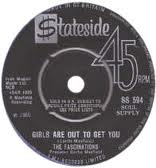 (UK 32, 1971), The Newbeats' 1965 American hit "Run Baby Run" (UK 10, Oct 1971), Bobby Hebb's "Love Love Love" which was originally the B-side of his 1966 U.S. 1 "Sunny" (UK 32 August 1972,) Robert Knight's "Love On A Mountain Top" of 1968 (UK 10, November 1973), R. Dean Taylor's "There's A Ghost In My House" from 1967 (UK 3, May 1974), Al Wilson's "The Snake", Dobie Gray's "Out On The Floor" (UK 42, September 1975) and Little Anthony & The Imperials' "Better Use Your Head" (UK 42 July 1976).
(UK 32, 1971), The Newbeats' 1965 American hit "Run Baby Run" (UK 10, Oct 1971), Bobby Hebb's "Love Love Love" which was originally the B-side of his 1966 U.S. 1 "Sunny" (UK 32 August 1972,) Robert Knight's "Love On A Mountain Top" of 1968 (UK 10, November 1973), R. Dean Taylor's "There's A Ghost In My House" from 1967 (UK 3, May 1974), Al Wilson's "The Snake", Dobie Gray's "Out On The Floor" (UK 42, September 1975) and Little Anthony & The Imperials' "Better Use Your Head" (UK 42 July 1976).
A variety of recordings were made later in the 1970s that were specifically aimed at the northern soul scene, which also went on to become UK top 40 hits. These included: The Exciters' "Reaching For The Best" (UK 31, October 1975), L.J Johnson's "Your Magic Put A Spell On Me" (UK 27, February 1976), Tommy Hunt's "Loving On The Losing Side" (UK 28, August 1976) and "Footsee" by Wigan's Chosen Few (UK 9, January 1975).
"Goodbye Nothing To Say", by the white British group The Javells, was identified by Dave McAleer of Pye's Disco Demand label as having an authentic northern soul feel. McAleer gave a white label promotional copy to Russ Winstanley (a Wigan Casino DJ and promoter), and the tune became popular amongst the dancers at the venue. Disco Demand then released the song as a 45 RPM single, reaching UK 26 in November 1974. To promote the single on BBC's Top Of The Pops, the performer was accompanied by two Wigan Casino dancers.
In 2000, Wigan Casino DJ Kev Roberts compiled The Northern Soul Top 500, which was based on a survey of northern soul fans. The top ten songs were: "Do I Love You (Indeed I Do)" by Frank Wilson, "Out on the Floor" by Dobie Gray, "You Didn't Say a Word" by Yvonne Baker, "The Snake" by Al Wilson, "Long After Tonight is Over" by Jimmy Radcliffe, "Seven Day Lover" by James Fountain, "You Don't Love Me" by Epitome of Sound, "Looking for You" by Garnet Mimms, "If That's What You Wanted" by Frankie Beverly & the Butlers, and "Seven Days Too Long" by Chuck Wood.
African American athletes Tommie Smith and John Carlos performed their Black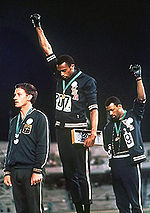 Power salute at the 1968 Summer Olympics in Mexico City
A large proportion of northern soul's original audience came from within the 1960s mod subculture. In the late 1960s, when some mods started to embrace freakbeat and psychedelic rock, other mods - especially those in northern England - stuck to the original mod soundtrack of soul and Blue Beat. From the latter category, two strands emerged: skinheads and the northern soul scene.
Power salute at the 1968 Summer Olympics in Mexico City
A large proportion of northern soul's original audience came from within the 1960s mod subculture. In the late 1960s, when some mods started to embrace freakbeat and psychedelic rock, other mods - especially those in northern England - stuck to the original mod soundtrack of soul and Blue Beat. From the latter category, two strands emerged: skinheads and the northern soul scene.
Early northern soul fashion included strong elements of the classic mod style, such as button-down Ben Sherman shirts, blazers with centre vents and unusual numbers of buttons, Trickers and brogue shoes and shrink-to-fit Levi's jeans. Some non-mod items, such as bowling shirts, were also popular. Later, northern soul dancers started to wear light and loose-fitting clothing for reasons of practicality. This included high-waisted, baggy Oxford trousers and sports vests. These were often covered with sew-on badges representing soul club memberships.
The clenched fist symbol that has become associated with the northern soul movement (frequently depicted on sew-on patches) emanates from the Black Power civil rights movement of the 1960s in the United States. The symbol is related to the salute given by African-American athletes at the 1968 Olympic games in Mexico City.On his visit to the Twisted Wheel in 1971, Dave Godin recalled that "...very many young fellows wore black "right on now" racing gloves ... between records one would hear the occasional cry of "Right on now!" or see a clenched gloved fist rise over the tops of the heads of the dancers!
In 2007, Andrew Wilson (lecturer in criminology at the University of Sheffield) published the extensively researched sociological study Northern Soul: Music, drugs and subcultural identity. This work details in some depth the lifestyles associated with the Northern soul scene and the extensive use of Amphetamines (otherwise known as speed) by many involved. Wilson argues that, whilst a significant proportion did not use drugs, drug usage was heavily ingrained in the fast-paced culture of the Northern soul scene and contributed to participants ability to stay up all-night dancing. Many clubs and events were closed down or refused licences due to concerns of local authorities that soul nights attracted drug dealers and users. Roger Eagle, DJ at the Twisted Wheel club in Manchester, cited Amphetamine usage amongst participants as his reason for quitting the club in 1967. Of the regular attendees he said, "All they wanted was fast-tempo black dance music... [but they were] too blocked on amphetamines to articulate exactly which Jackie Wilson record they wanted me to play.
The northern soul movement is cited by many as being a significant step towards the creation of contemporary club culture and of the superstar DJ culture of the 2000s. Two of the most notable DJs from the original northern soul era are Russ Winstanley and Ian Levine. As in contemporary club culture, northern soul DJs built up a following based on satisfying the crowd's desires for music that they could not hear anywhere else. The competitiveness between DJs to unearth 'in-demand' sounds led them to cover up the labels on their records, giving rise to the modern white label pressing. Many argue that northern soul was instrumental in creating a network of clubs, DJs, record collectors and dealers in the UK, and was the first music scene to provide the British charts with records that sold entirely on the strength of club play.
A technique employed by northern soul DJs in common with their later counterparts was the sequencing of records to create euphoric highs and lows for the crowd. Many of the DJ personalities and their followers involved in the original northern soul movement went on to become important figures in the house and dance music scenes. Notable among these are Mike Pickering, who introduced house music to The Haçienda in Manchester in the early 1980s, Neil Rushton, A&R manager of the House music record label Kool Kat Music and the dance record producers Pete Waterman and Ian Levine.
Northern soul has influenced several notable musicians. Terry Christian — in his 2008 article about northern soul for The Times — wrote, "There's an instant credibility for any artist or brand associated with a scene that has always been wild, free and grassroots. Soft Cell had chart success with covers of two popular northern soul songs, "Tainted Love" (originally recorded by Gloria Jones) and "What?" (originally recorded by Judy Street). Soft Cell member Dave Ball used to occasionally attend soul nights at Blackpool Mecca and Wigan Casino. Moloko's video for "Familiar Feeling" is set against a northern soul backdrop and was directed by Elaine Constantine, a longstanding northern soul enthusiast. The video was choreographed by DJ Keb Darge, who rose to prominence at the Stafford Top Of The World all-nighters in the 1980s.
During the Northern soul scene's initial years in the late 1960s and early 1970s, popular Northern Soul records were usually not recent releases, and generally dated from the mid-1960s. This meant that the movement was sustained (and "new" recordings added to playlists) by prominent DJs discovering rare and previously overlooked records. Later on, certain clubs and DJs began to move away from the 1960s Motown sound and began to play new releases with a more contemporary sound.
History
Photograph of a sew-on patch featuring the clenched fist
 symbol adopted by the northern soul movement
The phrase northern soul emanated from the record shop Soul City in Covent Garden, London, which was run by journalist Dave Godin. It was first publicly used in Godin's weekly column in Blues and Soul magazine in June 1970. In a 2002 interview with Chris Hunt of Mojo magazine, Godin said he had first come up with the term in 1968, to help employees at Soul City differentiate the more modern funkier sounds from the smoother, Motown-influenced soul of a few years earlier
I had started to notice that northern football fans who were in London to follow their team were coming into the store to buy records, but they weren't interested in the latest developments in the black American chart. I devised the name as a shorthand sales term. It was just to say 'if you've got customers from the north, don't waste time playing them records currently in the U.S. black chart, just play them what they like - 'Northern Soul'
symbol adopted by the northern soul movement
The phrase northern soul emanated from the record shop Soul City in Covent Garden, London, which was run by journalist Dave Godin. It was first publicly used in Godin's weekly column in Blues and Soul magazine in June 1970. In a 2002 interview with Chris Hunt of Mojo magazine, Godin said he had first come up with the term in 1968, to help employees at Soul City differentiate the more modern funkier sounds from the smoother, Motown-influenced soul of a few years earlier
I had started to notice that northern football fans who were in London to follow their team were coming into the store to buy records, but they weren't interested in the latest developments in the black American chart. I devised the name as a shorthand sales term. It was just to say 'if you've got customers from the north, don't waste time playing them records currently in the U.S. black chart, just play them what they like - 'Northern Soul'The venue most commonly associated with the early development of the northern soul scene was the Twisted Wheel in Manchester. The club began in the early 1950s as a beatnik coffee bar called The Left Wing, but in early 1963, the run-down premises were leased by two Manchester businessmen (Ivor and Phil Abadi) and turned into a music venue. Initially the Twisted Wheel mainly hosted live music on the weekends and Disc Only nights during the week. Starting in September 1963, the Abadi brothers promoted all-night parties at the venue on Saturday nights, with a mixture of live and recorded music. DJ Roger Eagle, a collector of imported American soul, jazz and rhythm and blues, was booked around this time, and the club's reputation as a place to hear and dance to the latest American R&B music began to grow.
Throughout the mid-1960s, the Twisted Wheel became the focus of Manchester's emerging mod scene, with a music policy that reflected Eagle's eclectic tastes in soul and jazz, and featuring live performances by British beat musicians and American R&B stars. Gradually, the music policy became less eclectic and shifted heavily towards fast-paced soul, in response to the demands of the growing crowds of amphetamine-fuelled dancers who flocked to the all-nighters. Dismayed at the change in music policy and the frequent drug raids by the police, Eagle quit the club in early 1967.
Commemorative sew-on patch similar to those worn by Twisted Wheel members.
 By then, the reputation of the Twisted Wheel and the type of music being played there had grown nationwide. By 1969, soul fans were travelling from all over the United Kingdom to attend the Saturday all-nighters. The venue's owners had been able to fill the vacancy left by Eagle with a growing roster of specialist soul DJs. After attending one of the venue's all-nighters in January 1971, Godin wrote: "...it is without doubt the highest and finest I have seen outside of the USA... never thought I'd live to see the day where people could so relate the rhythmic content of Soul music to bodily movement to such a skilled degree!
By then, the reputation of the Twisted Wheel and the type of music being played there had grown nationwide. By 1969, soul fans were travelling from all over the United Kingdom to attend the Saturday all-nighters. The venue's owners had been able to fill the vacancy left by Eagle with a growing roster of specialist soul DJs. After attending one of the venue's all-nighters in January 1971, Godin wrote: "...it is without doubt the highest and finest I have seen outside of the USA... never thought I'd live to see the day where people could so relate the rhythmic content of Soul music to bodily movement to such a skilled degree!The Twisted Wheel gained a reputation as a drug haven, and under pressure from the police and other authorities, the club closed in January 1971. However, by the late 1960s, the popularity of the music and lifestyle associated with the club had spread further across the north and midlands of England, and a number of new venues had begun to host soul all-nighters. These included the King Mojo in Sheffield, The Catacombs in Wolverhampton, Room at the Top in Wigan and Va Va's in Bolton.
1970s
Commemorative sew-on patch similar to those worn by Golden Torch members. Northern soul reached the peak of its popularity in the mid to late 1970s.
 At this time, there were soul clubs in virtually every major town in the midlands and the north of England.The three venues regarded as the most important in this decade were the Golden Torch in Tunstall, Stoke (1971 to 1972), Blackpool Mecca (1971 to 1979) and Wigan Casino (1973 to 1981).
Although Wigan Casino is now the most well known, the best attended northern soul all-night venue at the beginning of the decade was the Golden Torch, where regular Friday night soul all-nighters began in late 1970. Chris Burton, the owner, stated that in 1972, the club had a membership of 12,500, and 62,000 separate customer visits. Despite its popularity, the club closed down due to licensing problems in March, 1972 and attention switched to soul nights at Blackpool Mecca's Highland Room, which had started rare soul nights in late 1971.
At this time, there were soul clubs in virtually every major town in the midlands and the north of England.The three venues regarded as the most important in this decade were the Golden Torch in Tunstall, Stoke (1971 to 1972), Blackpool Mecca (1971 to 1979) and Wigan Casino (1973 to 1981).
Although Wigan Casino is now the most well known, the best attended northern soul all-night venue at the beginning of the decade was the Golden Torch, where regular Friday night soul all-nighters began in late 1970. Chris Burton, the owner, stated that in 1972, the club had a membership of 12,500, and 62,000 separate customer visits. Despite its popularity, the club closed down due to licensing problems in March, 1972 and attention switched to soul nights at Blackpool Mecca's Highland Room, which had started rare soul nights in late 1971.Commemorative sew-on patch similar to those designed by Russ Winstanley and sold at the Wigan Casino.
 Wigan Casino began its weekly soul all-nighters in September 1973.Wigan Casino had a much larger capacity than many competing venues and ran its events from 2am until 8am. There was a regular roster of DJs, including the promoter Russ Winstanley. By 1976, the club boasted a membership of 100,000 people, and in 1978, was voted the world's number one discotheque by the American magazine Billboard.This was during the heyday of the Studio 54 nightclub in New York City. By the late 1970s, the club had its own spin-off record label, Casino Classics.
By this time, Wigan Casino was coming under heavy criticism from many soul fans. Contemporary black American soul was changing with the advent of funk, disco and jazz-funk, and the supply of recordings with the fast-paced northern soul sound began to rapidly dwindle. As a result, Wigan Casino DJs resorted to playing any kind of record that matched the correct tempo.Also, the club was subjected to heavy media coverage and began to attract many otherwise uninterested people of whom the soul purists did not approve.
Wigan Casino began its weekly soul all-nighters in September 1973.Wigan Casino had a much larger capacity than many competing venues and ran its events from 2am until 8am. There was a regular roster of DJs, including the promoter Russ Winstanley. By 1976, the club boasted a membership of 100,000 people, and in 1978, was voted the world's number one discotheque by the American magazine Billboard.This was during the heyday of the Studio 54 nightclub in New York City. By the late 1970s, the club had its own spin-off record label, Casino Classics.
By this time, Wigan Casino was coming under heavy criticism from many soul fans. Contemporary black American soul was changing with the advent of funk, disco and jazz-funk, and the supply of recordings with the fast-paced northern soul sound began to rapidly dwindle. As a result, Wigan Casino DJs resorted to playing any kind of record that matched the correct tempo.Also, the club was subjected to heavy media coverage and began to attract many otherwise uninterested people of whom the soul purists did not approve.Blackpool Mecca was popular throughout the 1970s, although the venue never hosted all-nighters. The regular Saturday night events began at 8pm and finished at 2am, and initially, some dancers would begin their evenings at Blackpool Mecca and then transfer to Wigan Casino. In 1974, the music policy at Blackpool Mecca sharply diverged from Wigan Casino's, with the regular DJ including newly released US soul in his playlist. Whilst the tempo was similar to the earlier Motown Records-style recordings, this shift in emphasis heralded a slightly different style of northern soul dancing and dress styles at Blackpool Mecca and created a schism in the northern soul movement between Wigan Casino's traditionalists and Blackpool Mecca's more progressive approach, which accepted the more contemporary sounds of Philly soul, early disco and funk.
Other major northern soul venues in the 1970s include The Catacombs in Wolverhampton, Va Va's in Bolton, the 'Talk of The North' all-nighters at The Pier and Winter Gardens in Cleethorpes, Tiffany's in Coalville, Samantha's in Sheffield, Neil Rushton's 'Heart of England' soul club all-dayers at The Ritz in Manchester and the Nottingham Palais. As the 1970s progressed, the northern soul scene expanded even further nationally. There was a notable scene in the east of England with all-nighters at the St. Ivo Centre in St. Ives, the Phoenix Soul club at the Wirrina Stadium in Peterborough and the Howard Mallett in Cambridge. Other towns with notable northern soul venues at this time included Kettering, Coventry, Bournemouth, Southampton and Bristol.
1980s and later
When Wigan Casino closed in 1981, many believed that the northern soul scene was on the verge of disintegrating. However, the 1970s mod revival, the thriving scooterboy subculture and the Acid jazz movement produced a new wave of fans. The popularity of the music was further bolstered in the 1980s by a wave of reissues and compilation albums from small British independent record labels. Many of these labels were set up by DJs and collectors who had been part of the original northern soul scene. The 1980s — often dismissed as a low period for the northern soul scene by those who had left in the 1970s — featured almost 100 new venues in places as diverse as Bradford, London, Peterborough, Leighton Buzzard, Whitchurch, Coventry and Leicester. Pre-eminent among the 1980s venues were Stafford's Top of the World and London's 100 Club.
Today there are regular northern soul events in various parts of the United Kingdom, such as The Nightshift Club all-nighters at the Bisley Pavilion in Surrey and the Prestatyn Weekender in North Wales, Not forgeting the Kings Hall in Stoke On Trent. In an article entitled The Return Of Northern Soul in The Times in August 2008, broadcaster Terry Christian argued that northern soul was undergoing a distinct revival in the late 2000s. Christian cited the popularity of regular revivals of Twisted Wheel soul all-nighters at the original venue (in Whitworth Street, Manchester) plus the Beat Boutique northern soul all-nighters at the Ruby Lounge in Manchester. Many of those who ceased their involvement in the late 1970s have now returned to the scene and regularly participate in such events. As of 2009, Paul O'Grady has included a Northern Soul Triple in his weekly BBC Radio 2 show. He plays three northern soul hits, often at the request of his listeners
Music, artists and records
Photograph of the original release (left) and a re-issue copy (right)Music style
The music style most associated with northern soul is the heavy, syncopated beat and fast tempo of mid-1960s Motown Records, which was usually combined with soulful vocals. These types of records, which suited the athletic dancing that was prevalent, became known on the scene as stompers. Notable examples include Tony Clarke's "Landslide" (popularised by Ian Levine at Blackpool Mecca) and Gloria Jones "Tainted Love" (purchased by Richard Searling on a trip to the United States in 1973 and popularised at Va Va's in Bolton, and later, Wigan Casino.According to northern soul DJ Ady Croadsell, viewed retrospectively, the earliest recording to possess this style was the 1965 single I Can't Help Myself (Sugar Pie Honey Bunch) by The Four Tops, although that record was never popular in the northern soul scene because it was too mainstream.Other related music styles also gained acceptance in the northern soul scene. Slower, less-danceable soul records were often played, such as Barbara Mills' "Queen Of Fools" (popular in 1972 at the Golden Torch) and The Mob's "I Dig Everything About You". Every all-nighter at Wigan Casino ended with the playing of three well-known northern soul songs with a particular going home theme. Commercial pop songs that matched the up-tempo beat of the stompers were also played at some venues, including The Ron Grainer Orchestra's instrumental "Theme From Joe 90" at Wigan Casino and The Just Brothers' surf-guitar song "Sliced Tomatoes" at Blackpool Mecca. As the scene developed in the mid and late 1970s, the more contemporary and rhythmically sophisticated sounds of disco and Philly Soul became accepted at certain venues following its adoption at Blackpool Mecca. This style is typified musically by the O'Jays' "I Love Music" (UK 13, January 1976), which gained popularity prior to its commercial release at Blackpool Mecca in late 1975. The record that initially popularised this change is usually cited as The Carstair's "It Really Hurts Me Girl" (Red Coach), a record initially released late in 1973 on promotional copies - but quickly withdrawn due to lack of interest from American Radio stations. The hostility towards any contemporary music style from northern soul traditionalists at Wigan Casino led to the creation of the spin-off modern soul movement in the early 1980s.
Rarity
As venues such as the Twisted Wheel evolved into northern soul clubs in the late 1960s and the dancers increasingly demanded newly discovered sounds, DJs began to acquire and play rare and often deleted US releases that had not gained even a release in the UK. These records were sometimes obtained through specialist importers or, in some cases, by DJs visiting the US and purchasing old warehouse stock. Some records were so rare that only a handful of copies were known to exist, so northern soul DJs and clubs became associated with particular records that were almost exclusively on their own playlists. Many of the original artists and musicians remained unaware of their new-found popularity for many years. As the scene increased in popularity, a network of UK record dealers emerged who were able to acquire further copies of the original vinyl and supply them to fans at prices commensurate with their rarity and desirability. Later on, a number of UK record labels were able to capitalise on the booming popularity of northern soul and negotiate licenses for certain popular records from the copyright holders and reissue them as new 45s or compilation LPs. Amongst these labels were Casino Classics, PYE Disco Demand, Inferno, Kent Modern and Goldmine.
The notoriety of DJs on the northern soul scene was enhanced by the possession of rare records, but exclusivity was not enough on its own, and the records had to conform to a certain musical style and gain acceptance on the dance floor.Frank Wilson's "Do I Love You (Indeed I Do)" has been rated the rarest and most valuable northern soul single
Hits and other favourites
Many songs from the 1960s that were revived on the northern soul scene were reissued by their original labels and became UK top 50 hits in the 1970s. These include The Tams' 1964 recording "Hey Girl Don't Bother Me" (UK 1, July 1971) - which was popularized by Midlands DJ Carl Dene -The Fascinations' 1966 single "Girls Are Out To Get You"
 (UK 32, 1971), The Newbeats' 1965 American hit "Run Baby Run" (UK 10, Oct 1971), Bobby Hebb's "Love Love Love" which was originally the B-side of his 1966 U.S. 1 "Sunny" (UK 32 August 1972,) Robert Knight's "Love On A Mountain Top" of 1968 (UK 10, November 1973), R. Dean Taylor's "There's A Ghost In My House" from 1967 (UK 3, May 1974), Al Wilson's "The Snake", Dobie Gray's "Out On The Floor" (UK 42, September 1975) and Little Anthony & The Imperials' "Better Use Your Head" (UK 42 July 1976).
(UK 32, 1971), The Newbeats' 1965 American hit "Run Baby Run" (UK 10, Oct 1971), Bobby Hebb's "Love Love Love" which was originally the B-side of his 1966 U.S. 1 "Sunny" (UK 32 August 1972,) Robert Knight's "Love On A Mountain Top" of 1968 (UK 10, November 1973), R. Dean Taylor's "There's A Ghost In My House" from 1967 (UK 3, May 1974), Al Wilson's "The Snake", Dobie Gray's "Out On The Floor" (UK 42, September 1975) and Little Anthony & The Imperials' "Better Use Your Head" (UK 42 July 1976).A variety of recordings were made later in the 1970s that were specifically aimed at the northern soul scene, which also went on to become UK top 40 hits. These included: The Exciters' "Reaching For The Best" (UK 31, October 1975), L.J Johnson's "Your Magic Put A Spell On Me" (UK 27, February 1976), Tommy Hunt's "Loving On The Losing Side" (UK 28, August 1976) and "Footsee" by Wigan's Chosen Few (UK 9, January 1975).
"Goodbye Nothing To Say", by the white British group The Javells, was identified by Dave McAleer of Pye's Disco Demand label as having an authentic northern soul feel. McAleer gave a white label promotional copy to Russ Winstanley (a Wigan Casino DJ and promoter), and the tune became popular amongst the dancers at the venue. Disco Demand then released the song as a 45 RPM single, reaching UK 26 in November 1974. To promote the single on BBC's Top Of The Pops, the performer was accompanied by two Wigan Casino dancers.
In 2000, Wigan Casino DJ Kev Roberts compiled The Northern Soul Top 500, which was based on a survey of northern soul fans. The top ten songs were: "Do I Love You (Indeed I Do)" by Frank Wilson, "Out on the Floor" by Dobie Gray, "You Didn't Say a Word" by Yvonne Baker, "The Snake" by Al Wilson, "Long After Tonight is Over" by Jimmy Radcliffe, "Seven Day Lover" by James Fountain, "You Don't Love Me" by Epitome of Sound, "Looking for You" by Garnet Mimms, "If That's What You Wanted" by Frankie Beverly & the Butlers, and "Seven Days Too Long" by Chuck Wood.
Fashion and imagery
African American athletes Tommie Smith and John Carlos performed their Black
 Power salute at the 1968 Summer Olympics in Mexico City
A large proportion of northern soul's original audience came from within the 1960s mod subculture. In the late 1960s, when some mods started to embrace freakbeat and psychedelic rock, other mods - especially those in northern England - stuck to the original mod soundtrack of soul and Blue Beat. From the latter category, two strands emerged: skinheads and the northern soul scene.
Power salute at the 1968 Summer Olympics in Mexico City
A large proportion of northern soul's original audience came from within the 1960s mod subculture. In the late 1960s, when some mods started to embrace freakbeat and psychedelic rock, other mods - especially those in northern England - stuck to the original mod soundtrack of soul and Blue Beat. From the latter category, two strands emerged: skinheads and the northern soul scene.Early northern soul fashion included strong elements of the classic mod style, such as button-down Ben Sherman shirts, blazers with centre vents and unusual numbers of buttons, Trickers and brogue shoes and shrink-to-fit Levi's jeans. Some non-mod items, such as bowling shirts, were also popular. Later, northern soul dancers started to wear light and loose-fitting clothing for reasons of practicality. This included high-waisted, baggy Oxford trousers and sports vests. These were often covered with sew-on badges representing soul club memberships.
The clenched fist symbol that has become associated with the northern soul movement (frequently depicted on sew-on patches) emanates from the Black Power civil rights movement of the 1960s in the United States. The symbol is related to the salute given by African-American athletes at the 1968 Olympic games in Mexico City.On his visit to the Twisted Wheel in 1971, Dave Godin recalled that "...very many young fellows wore black "right on now" racing gloves ... between records one would hear the occasional cry of "Right on now!" or see a clenched gloved fist rise over the tops of the heads of the dancers!
Drugs
In 2007, Andrew Wilson (lecturer in criminology at the University of Sheffield) published the extensively researched sociological study Northern Soul: Music, drugs and subcultural identity. This work details in some depth the lifestyles associated with the Northern soul scene and the extensive use of Amphetamines (otherwise known as speed) by many involved. Wilson argues that, whilst a significant proportion did not use drugs, drug usage was heavily ingrained in the fast-paced culture of the Northern soul scene and contributed to participants ability to stay up all-night dancing. Many clubs and events were closed down or refused licences due to concerns of local authorities that soul nights attracted drug dealers and users. Roger Eagle, DJ at the Twisted Wheel club in Manchester, cited Amphetamine usage amongst participants as his reason for quitting the club in 1967. Of the regular attendees he said, "All they wanted was fast-tempo black dance music... [but they were] too blocked on amphetamines to articulate exactly which Jackie Wilson record they wanted me to play.
Influence on DJ culture
The northern soul movement is cited by many as being a significant step towards the creation of contemporary club culture and of the superstar DJ culture of the 2000s. Two of the most notable DJs from the original northern soul era are Russ Winstanley and Ian Levine. As in contemporary club culture, northern soul DJs built up a following based on satisfying the crowd's desires for music that they could not hear anywhere else. The competitiveness between DJs to unearth 'in-demand' sounds led them to cover up the labels on their records, giving rise to the modern white label pressing. Many argue that northern soul was instrumental in creating a network of clubs, DJs, record collectors and dealers in the UK, and was the first music scene to provide the British charts with records that sold entirely on the strength of club play.
A technique employed by northern soul DJs in common with their later counterparts was the sequencing of records to create euphoric highs and lows for the crowd. Many of the DJ personalities and their followers involved in the original northern soul movement went on to become important figures in the house and dance music scenes. Notable among these are Mike Pickering, who introduced house music to The Haçienda in Manchester in the early 1980s, Neil Rushton, A&R manager of the House music record label Kool Kat Music and the dance record producers Pete Waterman and Ian Levine.
Influence on musicians
Northern soul has influenced several notable musicians. Terry Christian — in his 2008 article about northern soul for The Times — wrote, "There's an instant credibility for any artist or brand associated with a scene that has always been wild, free and grassroots. Soft Cell had chart success with covers of two popular northern soul songs, "Tainted Love" (originally recorded by Gloria Jones) and "What?" (originally recorded by Judy Street). Soft Cell member Dave Ball used to occasionally attend soul nights at Blackpool Mecca and Wigan Casino. Moloko's video for "Familiar Feeling" is set against a northern soul backdrop and was directed by Elaine Constantine, a longstanding northern soul enthusiast. The video was choreographed by DJ Keb Darge, who rose to prominence at the Stafford Top Of The World all-nighters in the 1980s.
Its the music that counts
K.T.F.

.jpg)
.jpg)

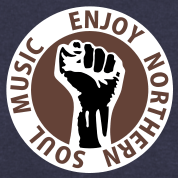
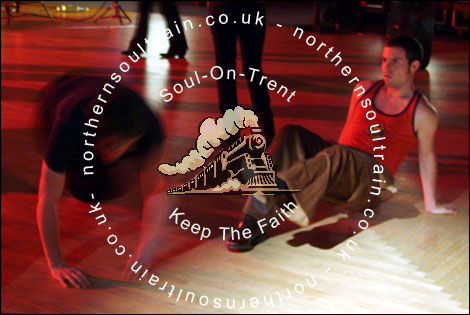
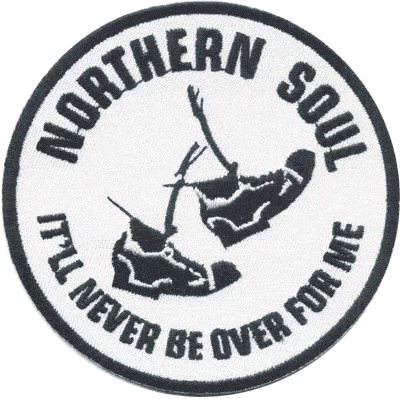
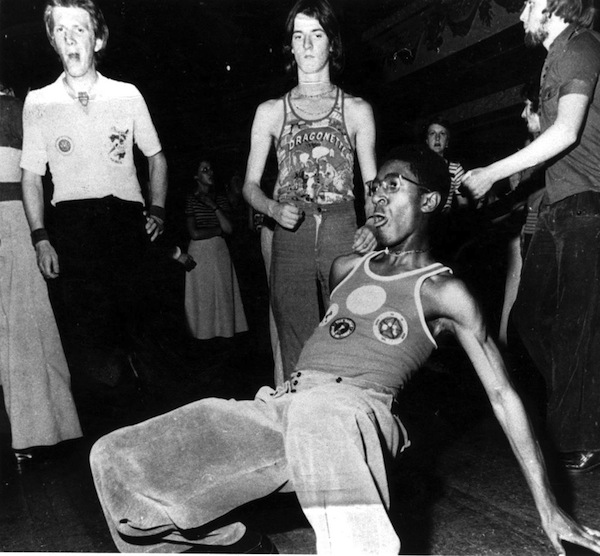
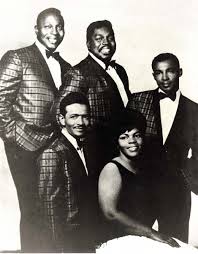
.jpg)
